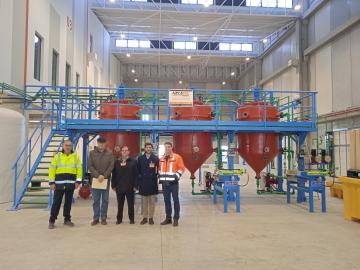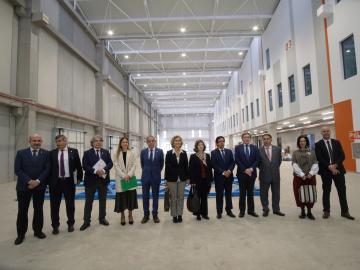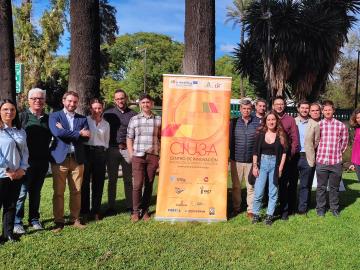Modelling, simulation and optimization of complex operational processes of the port-logistics infrastructure: digital twins of the port
Optimization of the processes of the industrial-port-logistics system, by means of the use of modelling, simulation, digital twin and optimization techniques.
Chief researcher
Researcher
Location
Technology
Mathematical modelling. Optimization. Simulation
Allied agents
Summary of the proposal
The project is to focus on the investigation and development of mathematical models and optimization techniques that enable the improvement of different operational and logistical processes in the framework of port facilities. At the same time, the development of digital twins of the port-logistics system will be undertaken, with the integration of the above-mentioned optimization techniques. In this way, a high capacity of simulation and predictive analysis of scenarios will be obtained, with connection to real data, making possible the study of cases of improvement and the optimization of the system, with case studies applied particularly to Seville’s port-logistics system.
Project goal
The goals sought in this project, and the associated doctoral research line, are the following:
1. To investigate and generate models of operational processes and infrastructure of the port of Seville and the logistical community of users (digital twins of the port and of the logistical and transport chains).
2. To develop advanced optimization techniques based on models for the improvement of port-logistics operations processes compared with the parameters and scenarios made possible by previous models.
3. To study specific scenarios and cases of the improvement of performance of logistical infrastructure (efficiency, capacity, costs, productivity, security, environmental).
4. Contribute to improving decision-making techniques and their integration into operational environments.
Expected results and indicators
Some of the results that are expected to be obtained by carrying out the project are:
1. Creation of digital models of cyber-physical systems and their integration into operational platforms.
2. Simulation of real cases applied to the port of Seville setting.
3. Development and implementation of new optimization techniques aiming at the improvement of port-logistics processes.
4. Support the improvement of performance in terms of logistical infrastructure regarding its efficiency, capacity, costs, productivity and safety.
5. Identification and proposal of new solutions that offer support to decision making.
6. Contribution to the technological transformation and digitalization of the port of Seville.
Potential technological impact of the project (TRL)
The port-logistics sector in Spain is characterized by its high complexity and non-centralized operations, with a low level of digitalization and optimization, and in which many different actors intervene. The research that is to be carried out within the framework of this project, together with the “Modelling and mining business processes in the port-logistics sector” and “Meta-heuristic optimization and uncertainty management in digital twin simulators of complex port-logistics infrastructure” projects, will offer tools in order to achieve a greater efficiency in the processes that are carried out in this complex scenario. These scenarios of greater efficiency will be the result of a top-down analysis that seeks a more effective coordination of the objectives and activities in the ports and their surroundings, mathematical models created based on a bottom-up mining of real processes, and the development/application of mathematical optimization algorithms to the global scenario.
The project’s results could be the basis for the development by Portel of new functional possibilities in its current systems that provide notable improvements in planning and operational processes in the port-logistics context, with the participation of the different actors involved. These systems will allow the customization of the solutions and services provided, the shared use of resources and the consideration of environmental aspects. This development could be applied at the national level, at least.
In the specific case of the port of Seville, which is the focus of the project’s activity and which is considered to be an asset of great value to the city, the project will lead to an improvement in its competitiveness, productivity, operational efficiency and, ultimately, an increase in port activity. Since the project’s goals are aligned with those set out in the port of Seville’s strategic plan, a high potential for applicability is expected.




